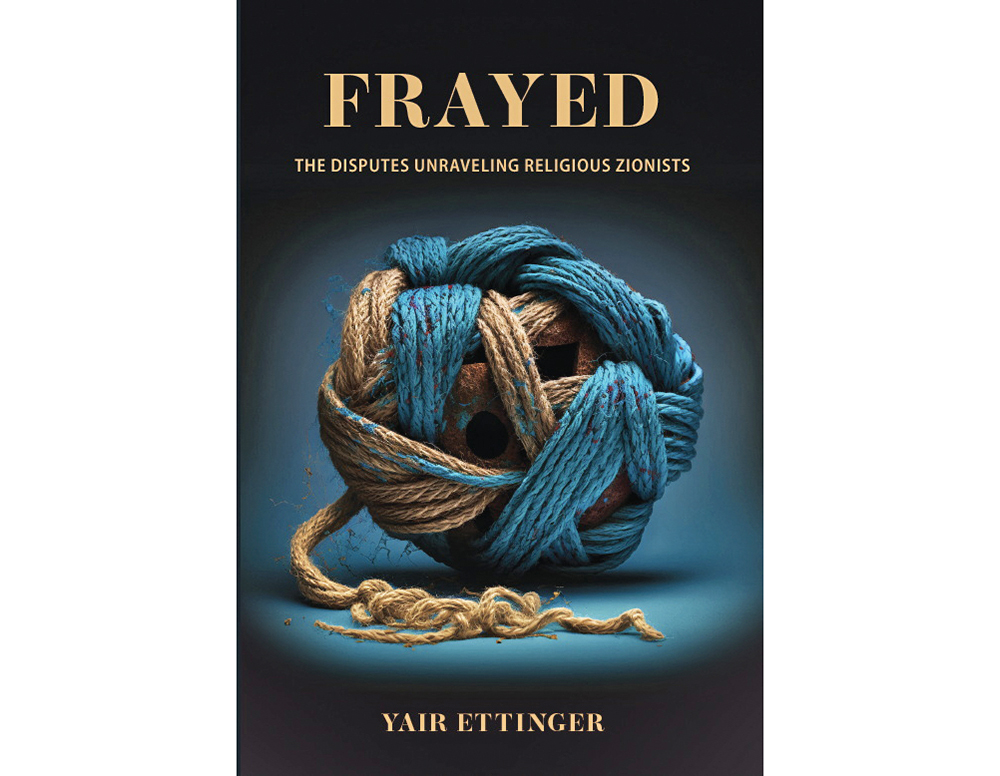
Reviewing: “Frayed: The Disputes Unraveling Religious Zionists,” by Yair Ettinger. Toby Press. 2023. 278 pages. ISBN-10: 1592645844.
Reading the book “Frayed: The Disputes Unraveling Religious Zionists” felt very personal to me. Having grown up in a Religious Zionist/Modern Orthodox home, been part of Bnei Akiva, learned in a Religious Zionist yeshiva and then made aliyah, the book spoke to many of the issues and trends that my generation has needed to address and come to terms with growing up.
“Frayed” takes a look at the key issues and disputes that are dividing the Religious Zionist community, predominantly in Israel but also in Diaspora communities. Spread across 10 chapters, the book explores topics including female religious leadership, partnership minyanim, prayer on the Temple Mount, inclusion in Judaism, the incorporation of women into IDF combat units and breaking the chief rabbinate’s monopoly.
“Frayed” is written by Yair Ettinger, an Israeli journalist who previously wrote for Haaretz and is now a religion and state reporter for one of Israel’s national news stations, Kan 11 News. Ettinger’s original Hebrew-language edition of the book was published in December 2019 and the English edition, published in 2023 by Toby Press, incorporates additional insights and developments including the Bennett-Lapid government.
Despite it being translated from the original Hebrew, “Frayed” is remarkable in its high-quality English and clarity in conveying complex ideas. It is a credit to the translators, editors and proofreaders and ensures the book is an easy, smooth read.
These efforts however, are only built on the extensive and impressive research by Ettinger, compiled over several years and pieced together to create a flowing and intriguing narrative. Despite tackling sensitive issues with the potential to offend readers on both sides of the divide, Ettinger presents a balanced view, quoting both supporters and opponents of reforms and voicing praises and critiques of changes in the Religious Zionist movement.
To appreciate Ettinger’s work it is vital for the reader to approach the book with an open mind and keep this mentality throughout. We are living in a world that increasingly minimizes dialogue and diminishes our ability to see someone else’s viewpoint. “Frayed” manages to rise above this and take a higher ground.
Throughout the book, Ettinger returns to multiple key figures both for additional insight and also to profile the major players who shape the developments and issues he discusses. Often, we find these rabbis and community leaders on both sides of major issues, sometimes offering a more conservative perspective, seeking to preserve the status quo and other times advocating for reform. These recurring appearances serve as a reminder of the dynamic, changing picture of Religious Zionism and how different rabbis have responded to modern-day changes.
While readers gain an insight into the inner workings of Religious Zionism in Israel, there is also a clear lesson for the Diaspora. Some of the disputes Ettinger covers, such as partnership minyanim and the rise of female rabbinic leadership, clearly originate from the Diaspora and have become embedded in Israeli society, while others, such as the lessening presence of a rabbi in community shuls, are starting to be seen and felt in the Diaspora. In this way, the book gives us the opportunity of both foresight in seeing how the evolution of Religious Zionism has played out and hindsight in learning from mistakes we have made in the past that have torn our communities apart.
This dual narrative of insight into societal changes and lessons for the Diaspora is perhaps strongest when the book discusses the “privatization of religion,” a key thesis that forms the bulk of Ettinger’s book. To quote: “Privatization resides in religious practice… Terms such as competition, private initiative, freedom of choice and self-determination have penetrated into the realm of the religious world in Israel.” Ettinger’s thesis is that religious, non-Haredi, Israelis are increasingly designing their own guardrails for Judaism, bound by rabbinic guidance while rejecting the status quo.
This quest for reform drives the disputes covered in the book, pitting two sides of the community against each other and leads Ettinger to his inevitable conclusion. “It is reasonable to assume that privatization… will be the force that charts the paths that Orthodox Jews pave for themselves in the coming years.”
For many readers, this outward display of dispute and disunity may come as both a surprise and a shock. The book was written and completed well before the tragic events of October 7 and the shining example of unity that followed. However, the discussions and narratives in the book are a sad reminder of the judicial protests of last year and the conflicts those reforms created, with the Religious Zionist community central to those disputes.
While the issues mentioned at the start of this review may seem trivial given the state of the world today and the challenges we are all facing, they really matter. As Ettinger notes, the Religious Zionist community is rapidly becoming the face of Israel, with its members taking up high-profile, public-facing roles in politics, the media and the IDF. How the next generation of Religious Zionists approach religion and decide on their balance of modernism and conservatism will be critical. How rabbis respond to these trends will shape the religious culture of Israel.
So, if you’re interested in what a future Israel looks like and how it will continue to evolve religiously, “Frayed” is a great place to start.
Daniel Davis is a senior account executive at FINN Partners, a communications firm with offices on three continents. He lives with his wife in Jerusalem.








